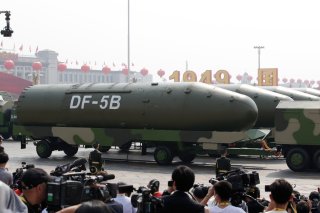Have Russia and China Killed Nuclear Arms Control?
Unless China can be persuaded to change its attitude toward transparency in its nuclear forces and deterrent policies, and that Russia and China both agree to seriously put all strategic and regional nuclear forces on the table for verifiable limits, arms control may go away as a major construct of U.S. deterrent policy.
Fast forward a decade: relations with Russia are now significantly more hostile. Major elements of Russia’s nuclear arsenal are completely modernized (over 88 percent according to Putin), while the entirety of China’s nuclear forces remains beyond any limits.
Thus, the United States is facing at least a two-to-one imbalance in strategic nuclear forces, and a ten or twenty-to-one imbalance in theater nuclear systems, while having to undertake deterrent policies both protecting the U.S. homeland and U.S. allies.
The implications for nuclear deterrence and arms control could thus not be starker. Contrary to the assumption that arms control could continue a somewhat automatic slide of reductions toward zero, the United States is facing the prospects—for the first time in multiple decades—that projected modern force levels of twelve Columbia-class submarines, 400 Ground-Based Strategic Deterrent ICBMs, and some sixty bombers will not provide an adequate future deterrent.
What then should we make of Congress’ assumption that nuclear modernization and arms control are two sides of the same nuclear deterrent coin, that one must go with the other? Unless China can be persuaded to change its attitude toward transparency in its nuclear forces and deterrent policies, and that Russia and China both agree to seriously put all strategic and regional nuclear forces on the table for verifiable limits, the United States is now entering an era where nuclear modernization is a task bigger than what it had previously planned, and arms control may go away as a major construct of U.S. deterrent policy.
Peter Huessy is a Senior Fellow at the Hudson Institute and President of GeoStrategic Analysis. These views are his own.
Image: Reuters.

